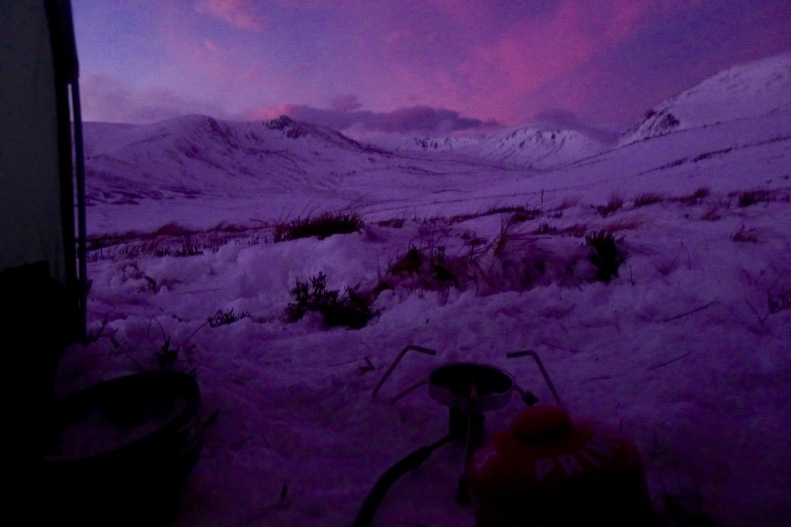
This bedtime view from the tent is one of the memories I carry from four days of tramping in the hill country north of the border last week. It had been far too long an absence; there is an intensity to this place that makes one wonder what exactly one has been doing with the rest of days. The endlessly changing light and colours, the shimmering dust of the galaxy, the pallour the moment the sun sets – it is all both heartbreakingly beautiful and the most natural thing in the world. There is an instinct that knows this and finds itself again in ways such as the ease with which the body slips into a rhythm that follows the hours of daylight. I compare this to the complaints about the long winter darkness that have been a recurrent conversation topic during the past few years, and see how a whole framework of living can be dismantled overnight.
*
It is sometimes said that the hills, in winter especially, are unforgiving. I do not think it is quite so simple. If one approaches one’s surroundings with respect and humility, there are second chances, and there are opportunities to learn and grow that never really come to an end. It is, more than anything else, a landscape in which simply to be. That takes many forms, but one of the things they have in common is the state of being utterly absorbed in the here and now. I remember following a bearing through the clag across a thawing wasteland of boulders, snow, and heather, staggering in a crosswind that made movement akin to a circus act. It is not just the experience of sensory overload as the brain plays catch-up and works out that one has, after all, popped out of the cloud where one expected to end up; it is the satisfaction that comes from navigation as an art rather than a button-pushing game with the sat-nav. And it is the intimacy with the land that comes from picking a way marked by whatever rock or snowfield corner or vegetated hummock happens to be in the right direction at the limit of one’s vision, and the next, and the next, and the next.
*
Soon after returning, I made the mistake of checking my emails a final time before Christmas. One made me very angry. What was said, how it was said, and what was not said brought together a lot of the things that have made me sad and disillusioned as time has gone by in academia. I had decided some time ago that this sort of thing is no longer worth my time getting worked up about, but on this occasion the contrast with what came before set back that resolution. It did so because these places are not just a source of refuge but are a form of alternative: one does not have to live this way. To understand that, is not to think of an anthropomorphized landscape that punishes or suppresses the things from which I flee. Perhaps one could see it in those terms when it comes to things such as arrogance; but for the most part it is much more straightforward than that: there is simply no place for them here.